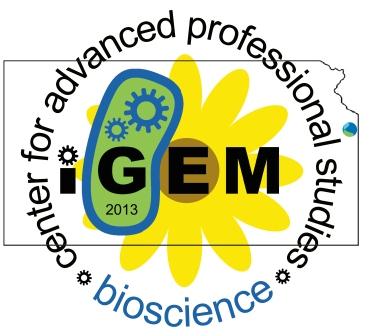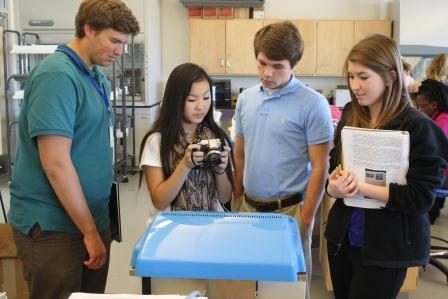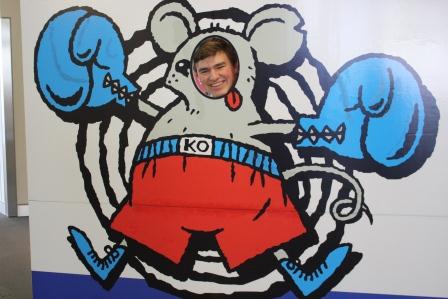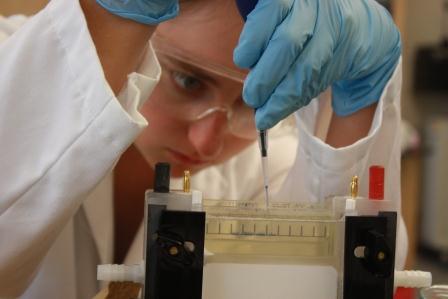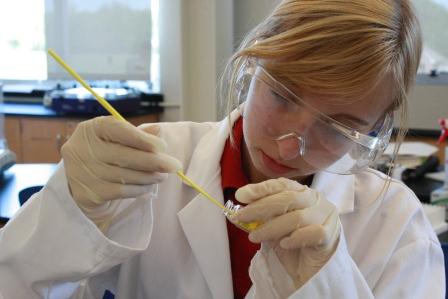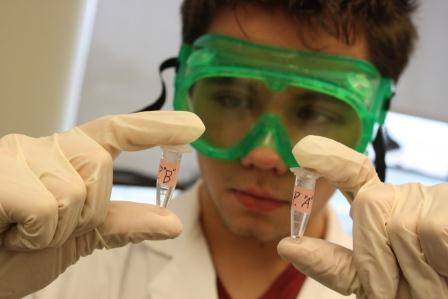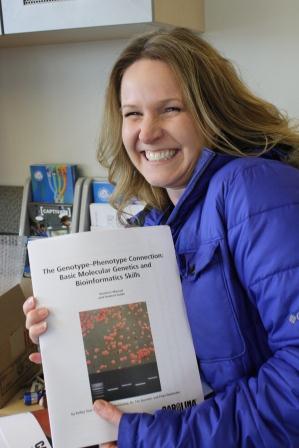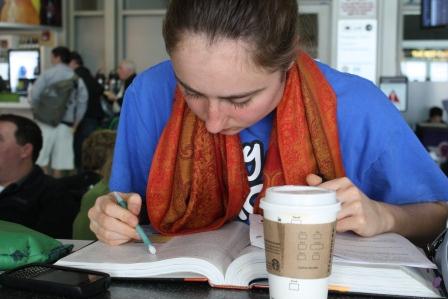Team:BV CAPS Kansas
From 2013hs.igem.org
(→Fun) |
(→Fun) |
||
| Line 164: | Line 164: | ||
[http://mic.sgmjournals.org/content/150/4/1103.full.pdf] '''Effect of pyruvate kinase overproduction on | [http://mic.sgmjournals.org/content/150/4/1103.full.pdf] '''Effect of pyruvate kinase overproduction on | ||
glucose metabolism of Lactococcus lactis''' by Ana Ramos, Ana Rute Neves, Rita Ventura, Christopher Maycock, Paloma Lopez and Helena Santos | glucose metabolism of Lactococcus lactis''' by Ana Ramos, Ana Rute Neves, Rita Ventura, Christopher Maycock, Paloma Lopez and Helena Santos | ||
| + | |||
| + | [http://jb.asm.org/content/168/3/1205.full.pdf] '''Oxidative Phosphorylation and Energy Buffering in Cyanobacteria''' by WOLFGANG H. NITSCHMANN AND GUNTER A. PESCHEK | ||
[http://www.pnas.org/content/110/19/7636.full.pdf] '''Synthesis of customized petroleum-replica fuel molecules by targeted modification of free fatty acid pools in Escherichia coli''' by Thomas P. Howard, Sabine Middelhaufe, Karen Moore, Christoph Edner, Dagmara M. Kolak, George N. Taylor, David A. Parker, Rob Lee, Nicholas Smirnoff, Stephen J. Aves, and John Love | [http://www.pnas.org/content/110/19/7636.full.pdf] '''Synthesis of customized petroleum-replica fuel molecules by targeted modification of free fatty acid pools in Escherichia coli''' by Thomas P. Howard, Sabine Middelhaufe, Karen Moore, Christoph Edner, Dagmara M. Kolak, George N. Taylor, David A. Parker, Rob Lee, Nicholas Smirnoff, Stephen J. Aves, and John Love | ||
Revision as of 04:04, 23 May 2013
Welcome to CAPS
Biofuels
The international oil industry drives our economy and very life of the world. However, this resource is dwindling and has detrimental effects on our atmosphere. In order to reduce oil usage and dependence, we will improve the efficiency of bio-fuels by manipulating the microbes used in their creation. One of the proposed biofuels is using alkanes to make biodiesel. They are useful because they float when the cell lysed and only needs to be dewatered. One way to produce alkanes is through Acetyl-CoA. Acetyl-CoA is synthesized by pyruvate. Pyruvate kinase converts phosphoenolpyruvate (PEP) into pyruvate. Pyruvate kinase adds a phosphate group from PEP to ADP to yield ATP and pyruvate.
Our iGEM project this year is to overexpress pyruvate kinase in cyanobacteria. To do this, we will insert a hyperactive pyruvate kinase from a rabbit muscle, yeast, or mutant cyanobacteria. This will increase the production of PEP greatly within the cyanobacteria. The excess PEP will then be used in the production of alkanes. Then, we will place the cyanobacteria in a low oxygen environment which will further suppress the usage of energy by limiting the electron transport chain. This energy would then be passed to the production of alkanes. Testing will be done with lipid extraction and profiling assay.
| Official Team Profile |
|---|
Contents |
Team
Blue Valley Center of Advanced Professional Studies (CAPS) is an outreach facility for students who wish to achieve higher goals and expectations in a professional environment. The team is composed of students from the Blue Valley district high schools giving us an array of students with different backgrounds and abilities.
Click here to see our team members.
Project
Click here to see the monthly lab notebooks.
Results/Conclusions
What did you achieve over the course of your semester?
Safety
What safety precautions did your team take? Did you take a safety training course? Were you supervised at all times in the lab?
[1] CAPS Bioscience Lab Safety Manual
Attributions
Who worked on what?
Team Members
Students
Mentors
Dr. Aron Fenton - [http://www.kumc.edu/school-of-medicine/biochemistry-and-molecular-biology/faculty/aron-w-fenton-phd.html]
Instructors
Eric Kessler
Mr. Kessler’s interest in biology can be traced to his youth on his family’s annual canoe trips where he was obsessed with catching turtles. He has earned three undergraduate degrees, in Education from UMKC, and Psychology and Zoology from the University of Texas. These studies were followed by a Masters in Biology from Emporia State University where he completed research on the retreat-site selection of woodland snakes. He complete 18 years at BVN before coming to CAPS, and maintains National Board Certification.
Kelley Tuel
Kelley Tuel will be the instructor for this course. She is a MS Degree candidate in Biology at Emporia State University. Her thesis is on the molecular genetics of Halobacterium sp. NRC-1, a salt-loving microbe, and its instructional use in high school classrooms. For her research, she isolated and named a previously undescribed mutant strain of the bacteria possessing a novel gene that can copy and paste itself around the genome. Colonies of the bacteria are in the adjacent image. Kelley holds undergraduate degrees in Biology and Education from KSU, and has previously taught high school Biology and AP Biology.
Joe Whalen
Mr. Whalen began his adult life in biology as a commercial fisherman in Alaska. His interest in the outdoors led him to complete an undergraduate degree in Environmental Science which he earned from the University of Kansas. From there he worked as a liaison between research and high school education as a GK-12 Fellow, and then completed three years teaching Biology, Zoology, AP Biology, and some physical science at Blue Valley High School. Before returning to CAPS he completed his Masters in Molecular and Cellular Biology at Oregon State University, where he studied genome defense mechanisms in the fungus, Fusarium graminearum. Mr. Walen is currently responsible for teaching the Bioscience Research course.
Human Practices
What impact does/will your project have on the public?
test video embed <wiki:video url="http://www.youtube.com/watch?v=0CDo55DH-z8"/>
Fun
Isn't Reading Quite Fun?
[2] Team Resources
References
General References on Biofuels
[http://cdn.intechopen.com/pdfs/43693/InTech-Metabolic_engineering_of_hydrocarbon_biosynthesis_for_biofuel_production.pdf] Metabolic Engineering of Hydrocarbon Biosynthesis for Biofuel Production by Anne M. Ruffing
[http://onlinelibrary.wiley.com/doi/10.1002/biot.200900220/pdf] Advanced biofuel production in microbes by Pamela P. Peralta-Yahya1, and Jay D. Keasling
[http://download.bioon.com.cn/upload/month_0906/20090602_9baf7ed8bf3db7b1eb2eXd9VaYDZvzAN.attach.pdf] Metabolic engineering of microorganisms for biofuels production: from bugs to synthetic biology to fuels by Sung Kuk Lee, Howard Chou, Timothy S Ham, Taek Soon Lee and Jay D Keasling
[http://www.microbialcellfactories.com/content/pdf/1475-2859-9-3.pdf] The path to next generation biofuels: successes and challenges in the era of synthetic biology by Clementina Dellomonaco, Fabio Fava, Ramon Gonzalez
[http://savagelab.org/media/papers/Savage_Silver_ACS_Chem_Biol_2008.pdf] Defossiling Fuel: How Synthetic Biology Can Transform Biofuel Production by David F. Savage, Jeffrey Way, and Pamela A. Silver
[http://www.ncbi.nlm.nih.gov/pmc/articles/PMC2857869/pdf/JBB2010-761042.pdf] Metabolic Engineering for Production of Biorenewable Fuels and Chemicals: Contributions of Synthetic Biology by Laura R. Jarboe, Xueli Zhang, Xuan Wang,Jonathan C. Moore,K. T. Shanmugam,and Lonnie O. Ingram
[http://www.ncbi.nlm.nih.gov/pmc/articles/PMC2863401/pdf/zek486.pdf] Genetic Engineering of Algae for Enhanced Biofuel Production by Randor Radakovits, Robert E. Jinkerson, Al Darzins, and Matthew C. Posewitz
[http://dspace.mit.edu/openaccess-disseminate/1721.1/68705] Synthetic Metabolism: Engineering Biology at the Protein and Pathway Scales by Collin H. Martin, David R. Nielsen, Kevin V. Solomon and Kristala L. Jones Prather
[http://www.fas.org/irp/agency/dod/jason/micro.pdf] ENGINEERING MICROORGANISMS FOR ENERGY PRODUCTION by Michael Brenner et. al.
[3] Jay Keasling on Biofuels - a collection of links to references, videos, etc...
Cyanobacteria and Pyruvate Kinase References
[http://pcp.oxfordjournals.org/content/44/7/758.full.pdf] From Genome to Enzyme: Analysis of Key Glycolytic and Oxidative PentosePhosphate Pathway Enzymes in the Cyanobacterium Synechocystis sp. PCC 6803 by Vicki L. Knowles and William C. Plaxton
[http://www.jbc.org/content/276/24/20966.full.pdf] Structural and Regulatory Properties of Pyruvate Kinase from the Cyanobacterium Synechococcus PCC 6301* by Vicki L. Knowles, Catherine S. Smith, Christopher R. Smith, and William C. Plaxton
[http://www.ncbi.nlm.nih.gov/pmc/articles/PMC1220531/pdf/10493919.pdf] Pathway alignment: application to the comparative analysis of glycolytic enzymes by Thomas Dandekar, Stefan Schuster, Berend Snel, Martijn Huynen and Peer Bork
[4] CO2-limitation-inducible Green Recovery of fatty acids from cyanobacterial biomass by Xinyao Liu, Sarah Fallon, Jie Sheng, and Roy Curtiss III
[http://www.ncbi.nlm.nih.gov/pmc/articles/PMC101911/pdf/jb002001.pdf] Pyruvate Kinase of the Hyperthermophilic Crenarchaeote Thermoproteus tenax: Physiological Role and Phylogenetic Aspects by ALEXANDER SCHRAMM,BETTINA SIEBERS,BRITTA TJADEN,HENNER BRINKMANN,AND REINHARD HENSEL
[http://mic.sgmjournals.org/content/150/4/1103.full.pdf] Effect of pyruvate kinase overproduction on glucose metabolism of Lactococcus lactis by Ana Ramos, Ana Rute Neves, Rita Ventura, Christopher Maycock, Paloma Lopez and Helena Santos
[http://jb.asm.org/content/168/3/1205.full.pdf] Oxidative Phosphorylation and Energy Buffering in Cyanobacteria by WOLFGANG H. NITSCHMANN AND GUNTER A. PESCHEK
[http://www.pnas.org/content/110/19/7636.full.pdf] Synthesis of customized petroleum-replica fuel molecules by targeted modification of free fatty acid pools in Escherichia coli by Thomas P. Howard, Sabine Middelhaufe, Karen Moore, Christoph Edner, Dagmara M. Kolak, George N. Taylor, David A. Parker, Rob Lee, Nicholas Smirnoff, Stephen J. Aves, and John Love
Synthetic Biology
[http://www.jbioleng.org/content/pdf/1754-1611-2-5.pdf] Engineering BioBrick vectors from BioBrick parts by Reshma P Shetty, Drew Endy and Thomas F Knight Jr
[http://dspace.mit.edu/bitstream/handle/1721.1/21168/biobricks.pdf?sequence=1] Idempotent Vector Design for Standard Assembly of Biobricks by Tom Knight
Diagrams
[5] Pathway Diagram
[6] Another Pathway Diagram
[7] A 3rd Pathway Diagram
Other Resources
[http://www.tinkercell.com/] Tinker Cell Website
[http://www.pdb.org/pdb/education_discussion/molecule_of_the_month/download/TheGlycoliticEnzymes.pdf] David Goodsell's piece on the Glycolytic Enzymes at the Protein Databank
Wiki Editing Resources
[8] iGEM FAQ, Wiki Editing
[http://www.mediawiki.org/wiki/Help:Contents] MediaWiki powers all iGEM pages, this is their help page
[9] If we get to CSS's
[http://www.mediawiki.org/wiki/Extension:AudioPlayer2] A way to add audio to a wiki
[http://www.mediawiki.org/wiki/Extension:Google_Maps] A way to add Google Maps to a wiki
[http://www.angelfire.com/nm/thehtmlsource/jazzup/javascript/slideshow.html] The code for adding an image slideshow in HTML
 Follow us on Twitter @CAPSiGEM
Follow us on Twitter @CAPSiGEM
 Join us on Facebook at High School iGEM 2013
Join us on Facebook at High School iGEM 2013

<forum_subtle />
 "
"
